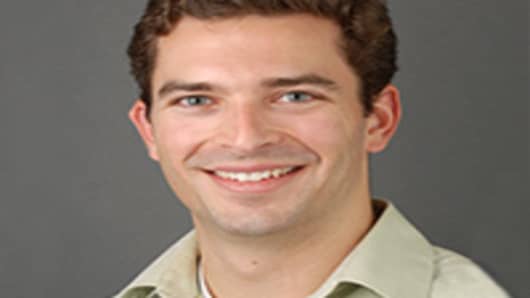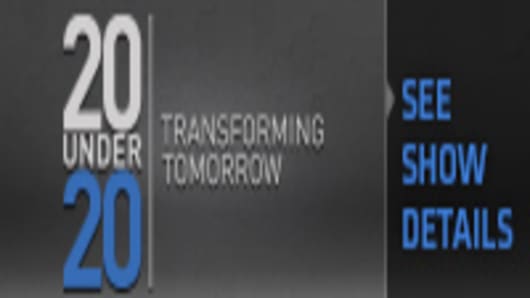Editor’s note: As part of CNBC’s “20 Under 20: Transforming Tomorrow” TV documentary, we interviewed thought leaders and visionaries who have paved the way for the next generation of entrepreneurs. In a series of Q&As called “5 Minutes with a Visionary,” we discover what has shaped and molded the careers of these innovators. The following interview was conducted via email.
Mint.com was created out of a desire to solve a real-world problem. In 2005, while handling his own personal budget, Mint.com founder Aaron Patzer had a realization. “I wanted to build a tool for my generation ... who don’t want to spend time balancing a checkbook or checking multiple financial institutions’ websites,” he told CNBC in an email interview. And so he did just that, spending seven months alone in a room for 14 hours a day, 7 days a week — occasionally listening to Frank Sinatra for inspiration.
Since its 2007 launch, Mint.com now tracks nearly $1 trillion in transactions and $485 billion in loans and assets for its more than 9 million users. According to Patzer, 90 percent of Mint’s users say they have changed their financial habits as a result of using the service. Are users’ spending habits changing? Yes, Patzer tells us. Eighty percent of Mint’s users see spending growth decline after using the site.
Two year after launching, Mint was acquired by Intuit, makers of Quicken, QuickBooks and TurboTax.
Q. What do you consider to be your greatest success as an entrepreneur?
One of my greatest successes as an entrepreneur is creating a solution to a real-world problem. Before Mint.com, I was a long-time user of Microsoft Money and Intuit's Quicken. Both were powerful tools, loaded with features and functionality around taxes, investment, budgeting — too feature-laden, in fact. They took hours to setup, forever to learn, and an hour a week to maintain.
I wanted a personal-finance tool for people who didn't want to be accountants, something you could setup in ten minutes and spend less than five minutes a week to maintain. I wanted to build a tool for my generation: people 20 to 40 who don't want to spend time balancing a checkbook or checking multiple financial institution’s websites. Mint does just that, giving comprehensive, quick insights into a user’s finances from their computer, mobile phone and/or tablet. Mint's average user is 30 years old and 40 percent of our new users are women, a stat that shocks our banking partners. They simply can't believe we cracked the code to getting young people interested in financial management.
Q. What innovation in the last 20 years has had the most positive impact on your life?
Definitely networked computing. I was fortunate to have a computer as a young child. By the time, and by the time I was 8, was regularly using online bulletin board systems (BBSes) for email, games, and access to online books. That really changed my life — simply knowing that I had access to tons of information, and could talk to people all over the world. By 13, I had access to the Internet, and soon after learned to build websites. At 16, I started a web development business and had clients from the Netherlands, Caribbean, and across the country — none of whom knew my age because I could conduct all my business with a phone, scanner, and the Internet. While I made a diversion into doing hardware (I worked on the Playstation III chip), this time was a precursor to doing Mint.com.
Q. What current challenge, when resolved, would do the most to change the world?
A radical change in the transportation infrastructure has the biggest power to change the world — just like efficient sailing ships opened up world trade in the 1400s, locomotives opened up the interior of continents, and the car has shaped the way all cities and houses are designed. I’ve spent the past year working on a maglev [magnetic levitation] system to replace cars, only to discover that it cannot be made cheaply enough (yet), and now to explore how to make the sensor systems for self-driving cars cheaper. Completely automated, faster individual transportation would be a game changer.
Q. If you had the world's intellectual elite all in one room, what thought provoking questions would you pose for debate?
How does human motivation change in a world where calories are (too) abundant, diseases are eradicated, and life is actually very comfortable compared to just 100 years prior? Does decadence slow progress because necessity — the mother of invention - is no longer so necessary?
Q. What individual or innovator has had the biggest impact on society? (and/or your career)
I consider myself an inventor first and an entrepreneur second. In real life, my hero is Thomas Edison. He was a great inventor, but also an outstanding entrepreneur who was able to sell his inventions to the masses. He didn’t just develop the light bulb; he invented the entire electric grid and power distribution system. General Electric, one of the world’s largest and most profitable companies, still stands today as his legacy.
For society, when I started Mint.com, I worked seven months alone in a room, 14 hours a day, seven days a week. It’s natural to doubt yourself: “Who am I to do this?” “If it was a good idea, someone would have already done it.” “How can I possibly compete with Microsoftand Intuit, two of the largest software companies in the world?” Whenever I felt that doubt, I listened to “That’s Life” by Frank Sinatra, or read my favorite Shakespeare quote: “Our doubts are traitors, and make us lose the good we might oft win, by fearing to attempt.” It’s okay to doubt yourself; it’s okay to feel down; just never give up.
Q. What was your ultimate goal in creating Mint.com? What did you want to accomplish?
Back in 2005, while using desktop software to catch up on my personal budgeting, I realized that I was in for an afternoon of tedious accounting-type work: poring over statements, filling in gaps in entries, and categorizing dozens of purchases. All this effort just to get to the answer of one, seemingly simple question: How much did I spend this month? And on what?
After a couple of hours, when I couldn’t get that answer (and I hold Masters degree in Computer Science and Engineering from Princeton and three undergraduate engineering degrees from Duke), I started to wonder if there wasn’t a better way. So instead of finishing, I began thinking about building what would become Mint.com. At the beginning, I worked alone in a room 14 hours a day, 7 days a week. I paid my first two employees from my savings, and once I closed my first round of seed funding from First Round Capital, I hired the best people I could find in Business Development, Marketing, Engineering and Product Design. Knowing we were building a great product that would help millions of people kept me going.
Building a product to solve a real problem was the ultimate goal. In this case, there are tens of millions of people using online banking who could benefit from having a single, aggregated look at their spending – and this thought drove me and my team every day.
Editor's Note: This interview has been condensed and edited. When this story was published, General Electric owned 49 percent of NBCUniversal, the parent company of CNBC.
Tune in:
Watch "20 Under 20" on CNBC. Part I Premieres August 13 and Part II Premieres August 14 at 10p ET
For more details on “20 Under 20: Transforming Tomorrow,” check out our Facebook app and follow our Tumblr blog.




